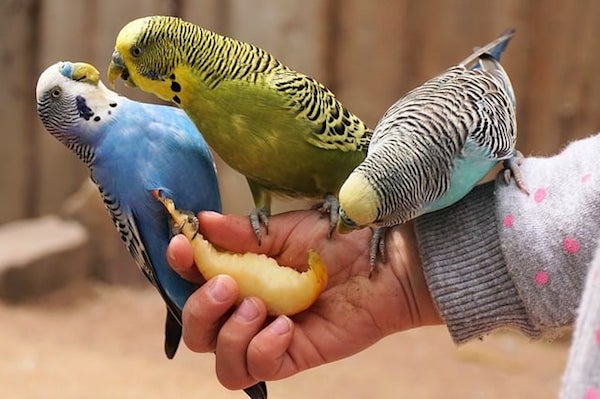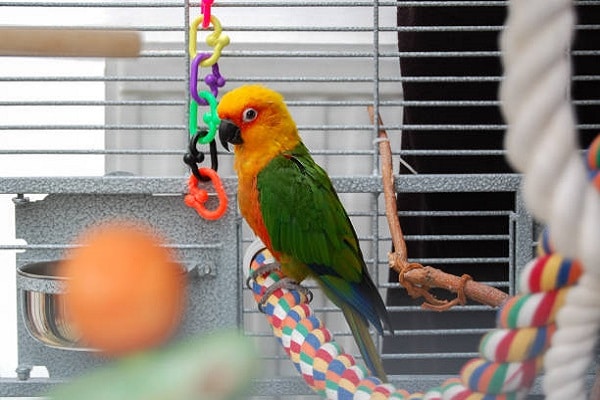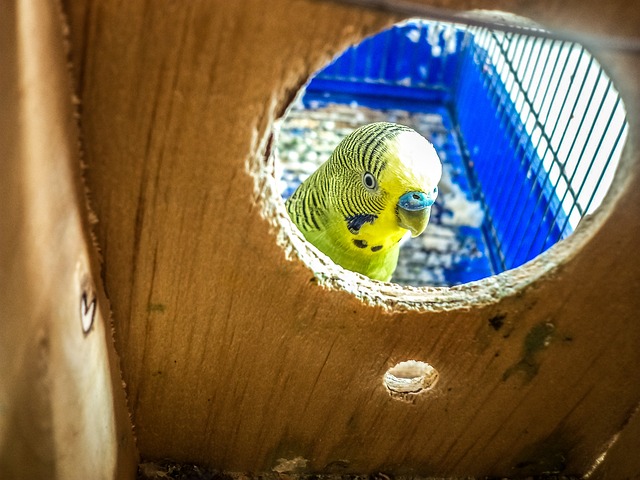
Feeding your pet birds the right foods is incredibly essential for their health. The key is to use a balanced diet from suitable bird nutrition recommendations.
As a bird pet lover, it is critical to balance your pet’s diet from the beginning to avoid many health and behavior issues. That’s because an unbalanced diet stands as the leading cause of disease and premature death amongst pet birds.
The big question is, what do you feed pet birds? Well, this guide discusses everything you need to about feeding your pet birds.
Pet Bird’s Base Diet
Not all pet birds feed on the same diet. The diets vary depending on the species of the bird. In other words, every pet bird has a specific base diet. That’s a primary food item that you feed the bird every day.
Basing on dietary classification, different pet birds feed primarily on a specific type of food.
For instance;
- Florivore – feed primarily on a plant-based diet which includes seeds, nuts, fruits, roots, barks, and berries.
- Granivore – pet birds that feed on seeds and grains
- Frugivore – feeds mainly on flowers and fruits, including some seeds and nuts.
- Omnivore – these bird’s diet comprises mainly fruits, seeds, insects, and invertebrates.
- Nectarivore – primarily relies on nectar, pollen, certain insects, and seeds for food.
Regardless of the case, the base diet for your bird must be very nutritional as that’s what the bird eats the most. Therefore, it is essential to understand the type of pet bird you have and provide it with the primary diet it deserves.
Your bird’s diet is vital for its health. A poor diet tends to reduce your bird’s lifespan and makes it more prone to many bacterial, fungal, and viral infections.
A good diet helps to improve the bird’s immune system and keeps it away from illness. Besides that, it keeps the bird’s feathers in amazing condition, raises its good spirits, and generally improves its life.
In most cases, you’ll find a pet bird’s base diet in a formula form to ensure it is fully nutritional. Such food products provide essential building blocks needed by all systems of your bird’s body.
Your pet birds will love and enjoy eating it. Plus, such diets come with a wide range of nutritious, healthy, and non-additive ingredients. This eliminates the need and effort of your bird to search in the wild.
Bird Seeds and Pellets
Most novice bird owners confuse about what their birds should eat. Is it the bird seeds or bird pellets? Well, both are healthy and nutritious foods for a pet bird. No option is significantly better than the other.
However, this may vary depending on the extra food you give your bird alongside it.
In most cases, bird pellets are an incredible option as they come fully balanced. They’re a complete food you can give your bird today.
Seeds alone may not be an ideal food option. That’s because it can’t supply the essential vitamins and minerals your birds need for optimal health.
So, you should complement the bird seeds with other foods like formulated foods like pelleted foods. You can also feed it with vegetables, fruits in small amounts, and also an occasional treat.
Fruits and Vegetables

Fruits and veggies do not necessarily contain a complete and balanced diet. But they are excellent additions to your pet bird’s balanced diet. They can serve best as daily snacks for your birds.
Vegetables act as a great source of carbohydrates, minerals, and vitamins. Typically, they should contribute about 15 to 30% of the diet you serve your birds. Fruits are rich in water and sugar and should be about 5%.
Consider the following fruits and vegetables:
Fruits
- Apples
- Bananas
- Berries
- Grapes
- Oranges
- Melons
- Pineapples
Vegetables
- Corn
- Broccoli
- Carrots
- Asparagus
- Cooked beans
- Cauliflower
- Leafy greens
- Peppers
- Peas
- Sprouts
- Squash
- Soybeans
- Yams
Avoid giving your pet bird celery or iceberg lettuce as they lack nutrients. They are only best for use as a source of fiber and water for the birds. Additionally, don’t feed your birds citrus fruits unless your avian veterinarian explicitly recommends so.
Avail different fresh fruits and vegetables to know which one does your bird likes the most.
What if your pet bird is choosy? Well, avail the fruits and veggies in different ways like chopped, grated, mashed, or any other suitable manner. You shouldn’t give up pretty fast as the bird may get curious to try the food.
Always wash all the fruits and vegetables well before feeding. Plus, ensure you rinse your bird’s feeders well before serving the food.
Since most fruits and vegetables are highly perishable, it is essential to remove and replace them after few hours. That’s because the fruits and vegetables may start getting sour or even attract nasty pests.
If possible, try to use organic produce.
When feeding the fruits and vegetables, try to mix varieties to create an appeal. Pet birds decide what they should eat depending on the texture, sight, and taste. So, provide a wide array of fruits and vegetables to create a balanced diet.
Maintain their natural state and try to be creative as you prepare meals for your bird. Hang the food from the cage’s top or sides. Weave the food into the cage’s bars or stuff the food inside the spaces left by pet toys. By doing so, you’ll entertain the bird and even offer mental and physical stimulation.
Supplement Your Pet Bird’s Diet
Most avian veterinarians recommend supplementing the diets for those birds that obsessively rely on seeds. That’s because the seeds don’t carry the necessary nutrients and minerals the bird needs for healthy growth.
Your bird could also be flaking, laying eggs, breeding, or recovering from an injury or illness. Perhaps the bird has stress due to a previous move, loss of a mate, or any other stressful situation.
Regardless of the case, supplementing is an excellent way to avail vital nourishment to your bird. This will help keep the bird in a healthy and good condition.
However, visit your avian veterinarian to determine the best and safe dietary supplementation for your pet bird. Failure to do so could potentially harm your pet bird due to over-supplementing or an underlying condition of the bird.
If you’re planning to use a powdered supplement, change the water about two times a day. Plus, provide only fresh and clean water without the supplement the night before feeding. This prevents the bacteria which could otherwise harm your bird from growing in the dish.
Cooked Food for Your Bird
Like most of us, pet birds love homemade meals. Preparing nutritious meals for your bird is pretty easy. You can make a very delicious bird recipe from a boiled egg. You can try making Nutri-Berrie yummies and avi (pan) cakes for your bird.
What foods you should not give your pet bird?
Some foods are not suitable for feeding your bird. They could cause digestive problems and other complications that you can imagine. In short, they are very toxic to the bird.
Such foods include:
• Avocado (glucamole)
• Alcohol or caffeine
• Apple seeds
• Chocolate
• Fruit pits
• Mushrooms
• Onions
• Persimmons
• Table salt
Conclusion
Birds have a specific set of diets that’s ideal for their well-being. Regardless of the type of bird species you bring to your home as a pet, it is essential to consult your avian veterinarian about the bird’s distinct nutritional needs.
Above all, feeding your bird a varied, healthy, and balanced diet is key to enhancing a quality birdlife. Besides, it can play a critical role in boosting your bird’s lifespan and immunity. To this end, we believe our guide above will help you adopt a healthy diet for your pet birds.




